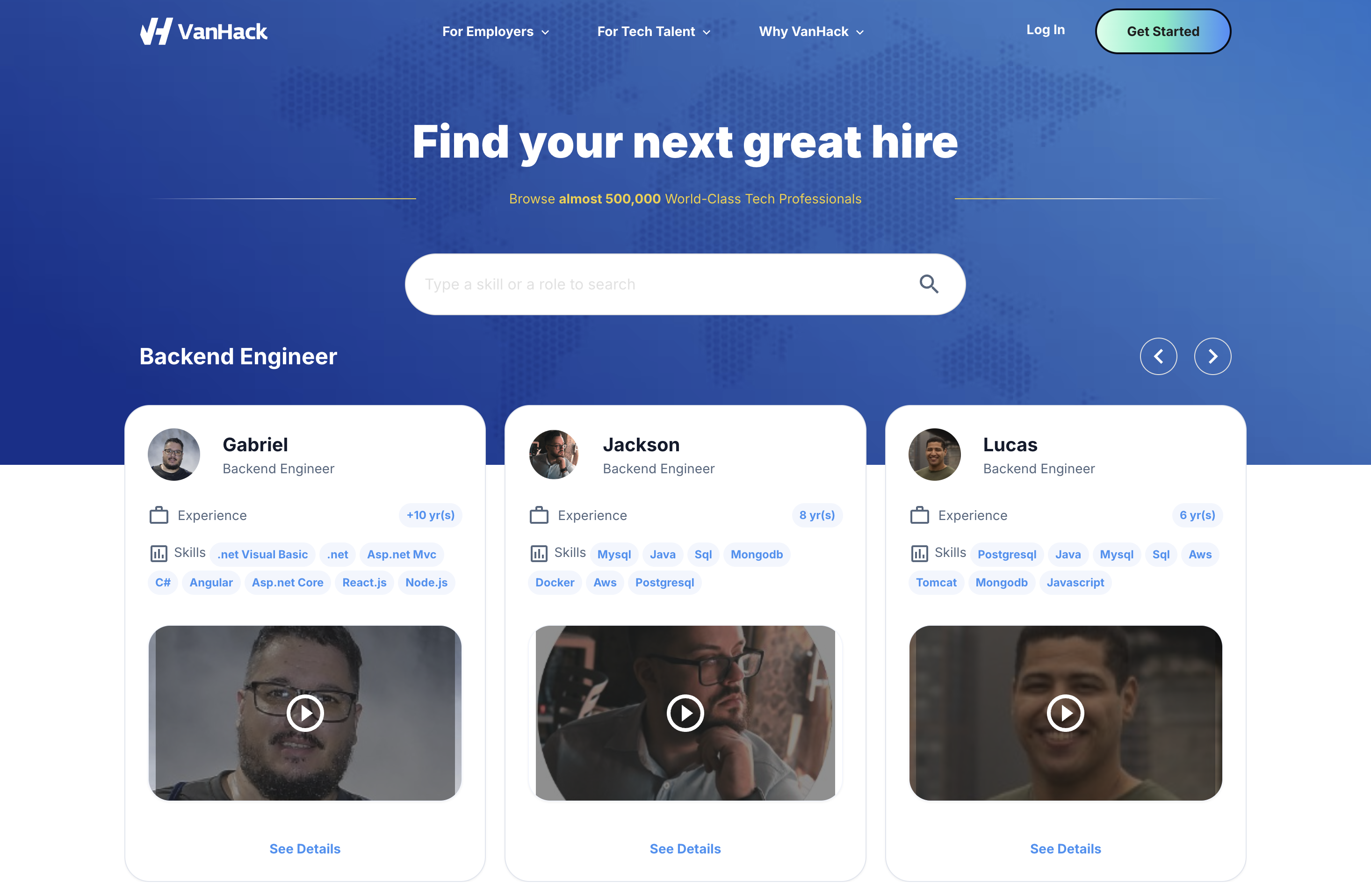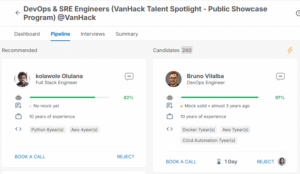Finding talented Vue.js developers can be tough for US companies, especially when balancing quality and cost. Latin America stands out as a strong option, with a growing pool of senior developers who offer competitive rates, solid English skills, and convenient time zone overlap. This guide shares seven straightforward strategies to help you hire effectively in this region and boost your remote team. Want to speed up the process? Connect with top talent through VanHack.
Why Latin America Offers a Strong Edge for Vue.js Hiring
Save on Costs Without Losing Quality: Vue.js Rates in LATAM
Hiring Vue.js developers from Latin America can cut your expenses significantly. You could save up to 52% compared to US-based costs, which is a major benefit for startups working with limited budgets.
Rates for senior Vue.js developers in the region vary by country. In 2025, hourly rates typically range from $28 to $39, offering flexibility based on your financial needs.
For specific figures, rates in key markets are: Mexico ($55-$80/hr), Brazil ($40-$60/hr), Argentina ($35-$55/hr), Colombia (up to $70/hr), and Chile (up to $90/hr). Mexico often has higher rates due to its closeness to the US and developed tech scene.
These rates are not just lower, they’re also competitive locally. This means you can attract skilled developers while spending far less than the $100-200+ per hour often seen in the US for similar expertise.
Work in Sync: Time Zone Benefits with North America
Latin America’s time zones align well with North American schedules. Countries like Mexico share Central or Mountain time with parts of the US, ensuring full overlap during work hours. Others, like Colombia, Brazil, and Argentina, have enough overlap for effective real-time teamwork.
This setup avoids the delays common with teams in Asia or Eastern Europe, where time differences can stall progress. Your Vue.js developers can join daily meetings, plan sprints, or fix urgent issues without scheduling conflicts, keeping projects on track.
For fast-moving startups, this overlap is a game-changer. It allows quick code reviews, immediate feedback on UI tweaks, and prompt handling of bugs, all during regular business hours.
Access Skilled Talent with Strong English Skills
The tech industry in Latin America has grown rapidly over the past decade. Major hubs like Mexico City, São Paulo, Buenos Aires, Bogotá, and Santiago now host experienced Vue.js developers who’ve tackled large-scale projects.
Education in the region supports this growth, with universities and coding bootcamps focusing on modern tools like Vue.js. Many developers here have worked with global clients, so they’re familiar with US project management styles and expectations.
English skills have also advanced, especially among tech professionals seeking international roles. Developers from places like Argentina often excel in communication, while those in Mexico benefit from regular interaction with the US market.
This blend of technical know-how and language ability ensures you’re hiring developers who can join your team and contribute to key decisions right away.
7 Effective Tips to Hire Remote Vue.js Developers from Latin America
1. Define Clear Requirements for Your Vue.js Role
Start by outlining exactly what you need in a Vue.js developer. Remote hiring requires detailed job descriptions since you can’t rely on in-person impressions to assess fit.
Specify the version of Vue.js, whether it’s Vue 2, Vue 3, or both. List tools like Nuxt.js for rendering, Vuex or Pinia for state management, Vue Router for navigation, and testing options like Jest. Mention specific tasks, such as updating old code to Vue 3’s Composition API or handling complex data flows.
Create technical tests to measure skills. Use coding challenges to check component design, state management, and optimization. Score these based on best practices, error handling, and framework understanding.
Include real-world tasks in assessments, like debugging performance issues or building a form with validation. These reveal how candidates solve problems and structure their code, beyond just passing a test.
2. Use Focused Platforms for Pre-Vetted LATAM Talent
General job boards like LinkedIn or Indeed often lead to hours of filtering through mismatched applications. Many candidates may lack the specific skills or English level needed for remote work.
Platforms tailored to Latin American tech talent simplify this. They understand local markets and pre-screen candidates for remote, cross-border roles.
VanHack, for instance, delivers a shortlist of 3-5 qualified candidates. Their profiles include video intros to gauge communication, AI-driven technical interviews, and coding test results from trusted tools.
These videos help you assess personality and language skills early on. The technical interviews show how candidates think through problems, giving deeper insight than a resume.
This pre-filtering saves effort, letting you focus on interviewing only strong Vue.js candidates. Explore skilled developers with VanHack and skip the clutter of unqualified applicants.

3. Build Strong Cross-Cultural and Remote Communication
Effective Vue.js teams need more than coding skills, they require clear communication across cultures and distances. When hiring from Latin America, focus on language ability and remote work experience.
In interviews, look beyond basic English. Test how candidates discuss technical topics, ask questions, and explain choices. Vue.js projects often involve decisions on structure and design, so developers must engage in these talks.
Use scenarios in assessments, like explaining Vue 2 versus Vue 3 APIs or organizing a multi-developer Vue.js app. This shows their ability to communicate complex ideas clearly.
Set communication rules early. Define when to use daily updates, how to give code feedback, and how to document work. Many remote teams balance async messages for details with video calls for problem-solving.
Equip your team with collaboration tools for Vue.js workflows. Shared coding platforms and design tools become vital for remote developers to work together on design and architecture.
4. Research Local Salary Expectations for Vue.js Developers
Understanding salary norms in Latin America is key to hiring skilled Vue.js developers. Average yearly salaries for developers are: Brazil ($31,480), Mexico ($28,420), Colombia ($25,150), and Argentina ($21,300), though senior Vue.js experts earn more.
These figures are for mid-level roles. Senior developers in tech hubs like Mexico City or São Paulo know their worth in global markets and expect fair pay for their skills.
Don’t apply US salary standards directly or undercut based on local living costs. Focus on Vue.js-specific rates, as frontend experts often earn more due to specialized demand.
Look at the full package, not just pay. Many developers value learning opportunities, flexible hours, and exposure to international work as much as salary.
Work with platforms like VanHack for insights on fair, competitive offers that attract talent without stretching your budget.
5. Simplify Interviews and Onboarding for Remote Hires
In a competitive market, slow hiring processes can lose you top Vue.js talent. Skilled developers often have multiple offers and prefer companies that value their time.
Keep interviews focused: start with a video call on experience and communication, follow with a technical session on Vue.js coding, and end with a team fit discussion.
Use tools to streamline scheduling, like calendar APIs and shared feedback platforms. VanHack’s pipeline tracker helps teams manage candidates and stay aligned.
Plan onboarding for remote needs. Provide detailed docs on your Vue.js setup and workflows. Share info on team communication and daily tools.
Assign quick, meaningful tasks for the first week, like building a component or improving docs. This helps new hires grasp your system while adding value.
Set a 30-60-90 day plan with clear goals and feedback. Remote developers thrive on structure since they miss casual office interactions. Hire efficiently with VanHack and use their tools to support the process.
6. Handle Legal and Payroll Rules for International Hires
Hiring from Latin America means dealing with varied legal and payroll rules by country. Getting this right avoids issues and builds smooth working relationships.
Decide between contractors or employees. Contractors are simpler but limit control over work style. Employees offer integration but require compliance with local taxes and benefits.
Each country has unique rules. Mexico regulates foreign employment, Brazil follows CLT laws, and Argentina has currency restrictions. Colombia simplifies contractor setups, while Chile supports tech workers.
Payroll depends on structure. Contractors might use wire transfers, while employees need local systems for taxes and social security.
Consider PEO or EOR services to manage compliance and payroll. They handle admin tasks so you can focus on hiring.
For relocation to the US or Canada, visas and logistics add complexity. VanHack’s Global Mobility team assists with visas and family moves.
Consult legal experts on international hiring to ensure proper setup and avoid future disputes.
7. Foster an Inclusive Remote Culture for Your Team
Creating a strong remote Vue.js team means actively including Latin American developers in your company culture. Without effort, remote staff can feel disconnected.
Invite them to join architecture talks, planning, and reviews. Ensure key decisions don’t happen in casual chats they can’t access.
Host virtual team events that fit different schedules, like coffee chats or cultural exchanges. These build connections across borders.
Offer equal growth paths with training, mentorship, and clear advancement steps. Many LATAM developers seek to expand their technical skills.
Set regular feedback for remote staff through one-on-ones and goal reviews. They need structured input since informal guidance isn’t available.
Recognize cultural differences in communication. Building personal rapport can enhance teamwork and satisfaction in many Latin American cultures.
Support their work setup with stipends for equipment or internet. Reliable tech is crucial for Vue.js work, and this shows commitment to their success.
How VanHack Stands Out for Hiring Vue.js Talent
Choosing the right platform affects how quickly and successfully you hire Vue.js developers from Latin America. Comparing options helps match your startup’s needs.
|
Feature |
VanHack |
Toptal |
Professional Networking Platforms & Job Boards |
|
Talent Pool |
Pre-vetted, senior tech talent; detailed profiles |
Vetted, global |
Mixed; needs heavy screening |
|
Vetting Depth |
Video intros, AI tech interviews, coding tests |
Manual interviews, coding tasks |
Minimal; relies on resumes |
|
Relocation |
In-house Global Mobility for visas & logistics |
Limited/None |
None |
|
Business Model |
Direct hire (subscription or success fee) |
Contractor model (ongoing margin) |
Direct hire; cost-per-post/applicant |
VanHack focuses on tech talent, cutting down screening time with pre-vetted candidates. Detailed profiles, video intros, and AI interviews provide clear insights into skills and fit.
Their direct hire model means no ongoing fees once hired, unlike contractor platforms with continuous costs.
For relocation needs, VanHack’s mobility team handles visa and logistics support, a benefit for international hiring.
General platforms offer wide reach but demand more internal effort for vetting and compliance, leading to hidden time and cost burdens.
Common Questions About Hiring Remote Vue.js Developers from Latin America
What Are Typical Hourly Rates for Senior Vue.js Developers in Latin America?
Hourly rates for senior Vue.js developers in Latin America range from $28 to $90, depending on country and experience. Mexico sits at $55-$80, Brazil at $40-$60, Argentina at $35-$55, Colombia up to $70, and Chile up to $90. These remain much lower than US rates, offering savings of up to 52% for comparable expertise.
How Does VanHack Verify the Quality of Vue.js Developers?
VanHack uses a thorough vetting process. Candidates provide video intros for communication assessment, complete AI-driven technical interviews with scored transcripts, and submit coding test results from standard platforms. This detailed approach offers more clarity than resume reviews alone.
What Advantages Do US Companies Gain by Hiring Vue.js Developers from Latin America?
US companies can save up to 52% on development costs, access a large pool of skilled Vue.js professionals, and benefit from time zone alignment for real-time collaboration. Many developers in the region have strong English skills and experience with global clients, easing team integration.
Can VanHack Help with Relocating Vue.js Developers to the US or Canada?
Yes, VanHack’s Global Mobility team supports relocation, managing visas and logistics like housing or schools. Developers often start remotely during the process to maintain productivity.
How Quickly Can I Hire a Vue.js Developer Through VanHack?
VanHack speeds up hiring with pre-vetted shortlists of 3-5 candidates. Detailed profiles and tools like interview scheduling APIs cut screening time, allowing faster decisions and hires.
Wrap-Up: Build Your Vue.js Team with VanHack
Hiring Vue.js developers from Latin America combines cost savings with access to skilled professionals. The region’s tech growth, time zone alignment, and language abilities make it a practical choice for expanding your team.
Managing global hiring on your own can be complex, from salary research to legal steps. Startups focused on growth often lack the resources for these tasks.
VanHack eases this challenge with curated candidate lists, detailed profiles, and support for interviews and relocation. Their direct hire model and focus on tech talent simplify the process.
For startups aiming to scale Vue.js development affordably, a specialized platform offers clear benefits over broad job boards or traditional methods.
Ready to strengthen your team without hiring stress? Get started with VanHack now and see how easy international hiring can be.



